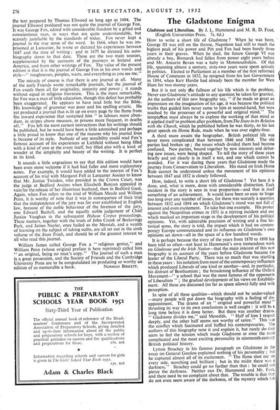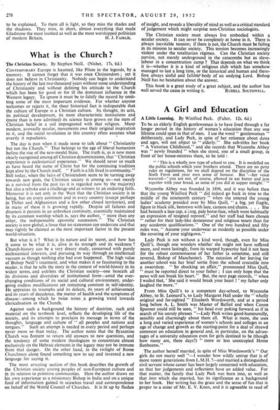The Gladstone Enigma
Gladstone and Liberalism. By J. L. Hammond and M. R. D. Foot. (English Universities Press. 7s. 6d.) How to write a short life of Gladstone ? When he was born, George III was still on the throne, Napoleon had still to reach the highest peak of his power and Pitt and Fox had been barely three years in their graves. When he died, the future George VI was already a boy, Bismarck had fallen from power eight years before and Mr. Aneurin Bevan was a baby in Monmouthshire. .0f this life, spanning almost a century, sixty-two years were spent actively in politics. Elected to Parliament as a member of the first reformed House of Commons in 1832, he resigned from his last Government in 1894, when Keir Hardie had already been the member for West Ham for two stormy years.
But it is not only ke fullness of his life which is the problem. Never can Gladstone's attitude to any question be taken for granted. As the authors of this new biography say, " if he made so great an impression on the imagination of his age, it was because the political truths that guided him never came to him at second-hand, but were reached by the processes of a powerful and original mind." The temptation must always be to explore the working of that mind as it applied itself to problem after problem, from The State in its Relation with the Church, which he published before he was thirty, to his last great speech on Home Rule, made when he was over eighty-four.
A third snare awaits the biographer. British political life was never more complicated than between 1846 and 1868. The old parties had broken up ; the issues which divided them had become confused. New parties, bound together by new interests and debat- ing new issues, were being shaped. To tell the story of these years briefly and yet clearly is in itself a test, and one which cannot be avoided. For it was during these years that Gladstone made the journey from Conservatism to Liberalism. His stand on Irish Home Rule cannot be understood unless the movement of his opinions between 1847 and 1852 is closely followed.
How, indeed, to write a short life of Gladstone ? Yet here it is done, and, what is more, done with considerable distinction. Each incident in the story is seen in true proportion—and that is itself something of an achievement. It would have been so easy to linger too long over any number of issues, for there was scarcely a questiol between 1832 and 1894 on which Gladstone's stand was not full cf interest and even excitement. To take but one example. His protest against the Neapolitan crimes in 1851 is a stirring incident and ore which marked an important stage in the development of his political opinions. Yet, with admirable precision of writing and a fine his- torical sense, the story is told, the impact which it had on contem- porary Europe communicated and its influence on Gladstone's own opinions set down—all in the space of a few hundred words.
It is perhaps because the story of the years from 1870 to 1898 has been told so often—not least in Hammond's own tremendous work on Gladstone and the Irish Nation—that the main interest of this new biography is its account of the years before Gladstone became the leader of the Liberal Party. There was so much that was startling in these years : his isolation from most of the contemporary influences which produced Liberals of one kind or another—and, in particular, his distrust of Benthamism ; the broadening influence of the Oxford Movement—" a school that was the most famous of the opponerts of Liberalism " ; the gradual development of his views on Establish- ment. All these are discussed (so far as space allows) fully and with perception.
In spite of all these qualities—which should not be under-valued —many people will put down the biography with a feeling of dis- appointment. The drama of an " original and powerful mind " thrusting its way to its own conclusions is well caught : it will be a long time before it is done better. But there was another drama. " Gladstone divides me," said Meredith. " Half of him I respect deeply, and the other half seems not worthy of satire." This was the conflict which fascinated and baffled his contemporaries. The authors of this biography note it and explain it, but rarely do they seem to feel the tension which made Gladstone at once the most complicated and the most exciting personality in nineteenth-century British political history.
Lytton Strachey in his famous paragraph on Gladstone in the essay on General Gordon explained nothing of his personality ; but he captured almost all of its excitement. " The flame shot out on every side, scorching and brilliant ; but in the midst there was a darkness." Strachey could go no further than that : he could not pierce the darkness. Neither can Dr. Hammond and Mr. Foot and there need be no complaint about that. The trouble is that they do not even seem aware of the darkness, of the mystery which hal to be explained. To them all is light, so they miss the shades and the shadows. They miss, in short, almost everything that made Gladstone the most loathed as well as the most worshipped politician



































 Previous page
Previous page